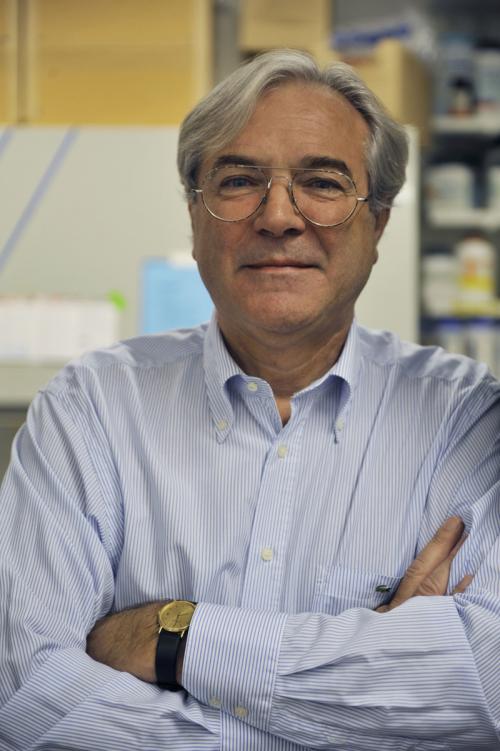
Former Postdoctoral Fellow in the MRC Protein Phosphorylation Unit is elected a Fellow of the Royal Society
Brian Hemmings, a postdoctoral fellow in the MRC Protein Phosphorylation Unit for three years from 1980-1982, has been elected a Fellow of The Royal Society, the highest accolade that a UK scientist can receive. 
Brian's election to the UK's 'Scientific Hall of Fame' recognizes his important and wide-ranging contributions to our understanding of protein kinases and protein phosphatases. His work solved the molecular complexity of the multiple regulatory components of protein phosphatase 2A. He was also the first to identify Protein Kinase B (PKB, also called Akt) and made important contributions to our understanding of its physiological roles. PKB has subsequently become an important target for the development of anti-cancer drugs, and inhibitors of this enzyme are undergoing clinical trials. More recently, Brian has made major advances to our understanding of the function and regulation of the NDR kinase
Commenting on Brian's election, MRC Unit Director Philip Cohen said: 'I congratulate Brian on this outstanding achievement. This is the fifth time in the past eight years that a scientist trained in our Unit has been elected to the Royal Society Fellowship. It means that 5% of all the Biochemists and Molecular Biologists that are currently Fellows of the Royal Society were trained in or are working in our Unit. This is truly remarkable bearing in mind the modest size of our Unit. It is a testament to the calibre of the people that we recruit and the training that they receive here".
About the Royal Society: 
Each year, just over 40 people across the UK, the British Commonwealth and the Republic of Ireland, working in all branches of science ranging from mathematics, astronomy, physics, chemistry, genetics, botany and medicine, are elected to The Royal Society. It is the world's oldest National Academy of Sciences being founded in 1660 by King Charles II.


About Brian Hemmings: 
Brian, who is 58, obtained his B.Sc from the University of Nottingham in 1972 and Ph.D. from the University of East Anglia in 1975. Following postdoctoral work with Helmut Holzer in Freiberg, Germany and then Earl Stadtman at the National Institutes of Health Bethesda, USA, he spent nearly three years in Philip Cohen's lab in the MRC Protein Phosphorylation Unit in Dundee from 1980-1982. He then set up his own research group at the Friedrich Miescher Institute, Basel, Switzerland, where he has worked ever since, being promoted to Senior Scientist in 1990. Brian's achievements have been recognized previously by election to membership of the European Molecular Biology Organisation in 1996. He also received the Cioetta Foundation (Zurich) Prize for 2000, a Japanese Biochemical Society (JB) Award in 2000, the Novartis Corporate Research Award for Scientific Excellence in 2004 and the Swiss Bridge Award for 2004. According to the Institute for Scientific Information in Philadelphia, Brian is one of the world's 100 most cited scientists working in the field of Biology and Biochemistry.
Commenting on Brian's election, MRC Unit Director Philip Cohen said: 'I congratulate Brian on this outstanding achievement. This is the fifth time in the past eight years that a scientist trained in our Unit has been elected to the Royal Society Fellowship. It means that 5% of all the Biochemists and Molecular Biologists that are currently Fellows of the Royal Society were trained in or are working in our Unit. This is truly remarkable bearing in mind the modest size of our Unit. It is a testament to the calibre of the people that we recruit and the training that they receive here".
About the Royal Society: 
Each year, just over 40 people across the UK, the British Commonwealth and the Republic of Ireland, working in all branches of science ranging from mathematics, astronomy, physics, chemistry, genetics, botany and medicine, are elected to The Royal Society. It is the world's oldest National Academy of Sciences being founded in 1660 by King Charles II.


About Brian Hemmings: 
Brian, who is 58, obtained his B.Sc from the University of Nottingham in 1972 and Ph.D. from the University of East Anglia in 1975. Following postdoctoral work with Helmut Holzer in Freiberg, Germany and then Earl Stadtman at the National Institutes of Health Bethesda, USA, he spent nearly three years in Philip Cohen's lab in the MRC Protein Phosphorylation Unit in Dundee from 1980-1982. He then set up his own research group at the Friedrich Miescher Institute, Basel, Switzerland, where he has worked ever since, being promoted to Senior Scientist in 1990. Brian's achievements have been recognized previously by election to membership of the European Molecular Biology Organisation in 1996. He also received the Cioetta Foundation (Zurich) Prize for 2000, a Japanese Biochemical Society (JB) Award in 2000, the Novartis Corporate Research Award for Scientific Excellence in 2004 and the Swiss Bridge Award for 2004. According to the Institute for Scientific Information in Philadelphia, Brian is one of the world's 100 most cited scientists working in the field of Biology and Biochemistry.

